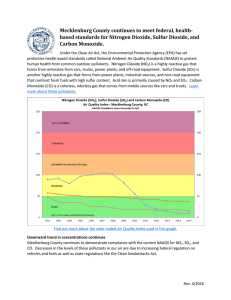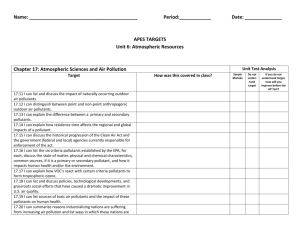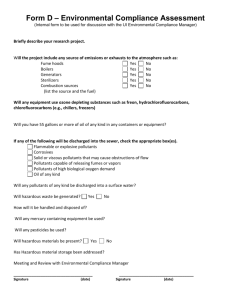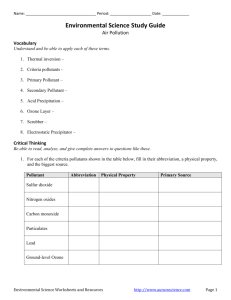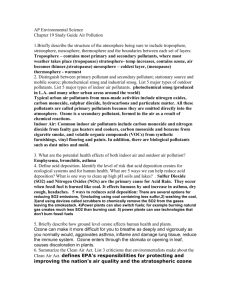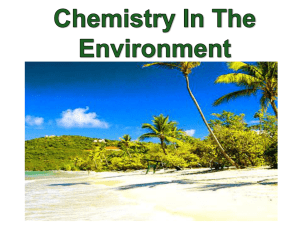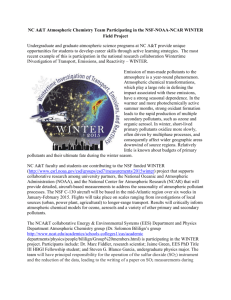lect 5 chem poll
advertisement
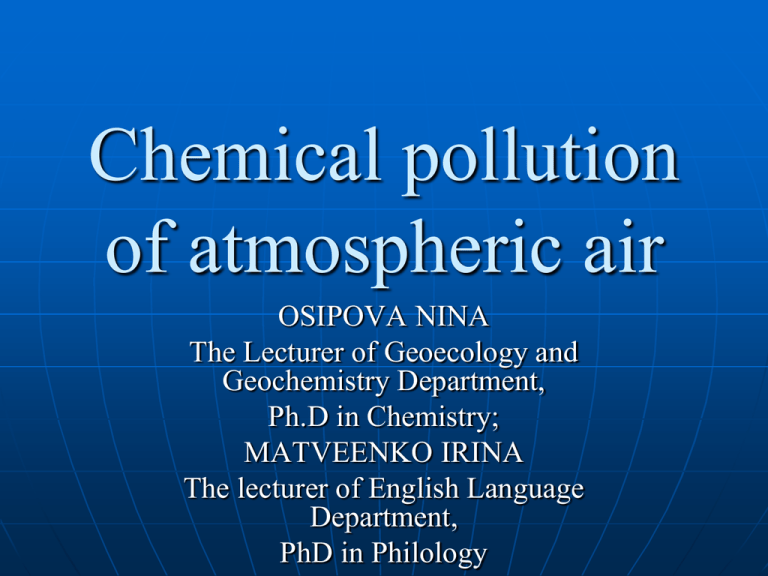
Chemical pollution of atmospheric air OSIPOVA NINA The Lecturer of Geoecology and Geochemistry Department, Ph.D in Сhemistry; MATVEENKO IRINA The lecturer of English Language Department, PhD in Philology CONTENT 1. Chemical pollution as one of the global ecological problems 2.The key pollutants – chemical structure, it’s main cources of origin, effects on human health 3. The content of chemical pollutants in atmospheric air of Tomsk Effects of key pollutants There are seven key pollutants of atmospheric air. These are air pollutants, that are known to have adverse effects on human health in sufficiently high concentrations and occur in all areas of the world. Many of the pollutants can also damage natural environment and buildings. Seven key pollutants Carbon monoxide Lead Nitrogen dioxide (NO2) and nitric oxide (NO) Ozone (O3) PM 10 (particulate matter) Sulphur dioxide (SO2) Benzene and 1,3 butadien Carbon monoxide Carbon monoxide inhibits the take up of oxygen in the blood. It is estimated, that 96% of CO emissions originate from road traffic. Lead The dominant source of lead is petrol combustion where it is incorporated as an anti-knock agent. In 1986 the permitted lead content in petrol was reduced from 0.40 to 0.15 g/l. As a result, lead emissions have reduced substantially. Nitrogen dioxide (NO2) and nitric oxide (NO) Nitrogen dioxide (NO2) and nitric oxide (NO) are released as the results of combustion of fossil fuels. Together NO2 and NO are referred to as total oxides of nitrogen or NOx. Half of the emissions of the oxide of nitrogen originate from road transport sources. Ozone (O3) Ozone (O3) Ozone (O3) at the Earth’s surface can be damaging on human health and vegetation. Ozone is a secondary pollutant. It is not directly emitted and is formed in the atmosphere by reaction with other gases, particularly on hot sunny days giving rise to smog. Ozone concentrations tend to be highest at rural locations downwind of urban areas. PM 10 (particulate matter) PM 10 (particulate matter with a diameter less than 10 µm) can be derived from combustion and natural sources. PM may be referred to as black smoke. Sulphur dioxide (SO2) Sulphur dioxide (SO2) Sulphur dioxide (SO2) causes health problems and can result in acid deposition and consequently corrosion of buildings and damage to ecosystems. Concentrations have decreased in the last decade. The main sources of SO2 are from fossil fuel combustion for energy generation and space heating in the domestic, commercial and industrial sectors. Benzene and 1,3 butadien Benzene and 1,3 butadien Benzene and 1,3 butadien Other atmospheric pollutants can have damaging effects on human health and environment include certain volative organic compounds, such as Benzene and 1,3 butadien both of which are considered to be carcinogenic materials. The dominant sources of Benzene and 1,3 butadien are road transport. These pollutants are regularly controlled by the State Whether Services (Tomsk Region)in atmospheric air Fig.1. The observation network for natural environment state: 1atmospheric air; 2soil; 3-surface water; 4- underground water; 5- intended for building area; 6industrial estate; 7edge; 8-number of area Average annual and maximum concentrations of pollutants in 1991-1995 years at the contamination control stations in Tomsk pollutant 2 5 7 11 12 13 14 PM 10 0,7/7,0 2,7/44,8 0,7/5,8 0,7/13,4 0,7/13,4 0,7/2,8 0,7/3,6 NOx 0,8/6,6 2,2/7,9 0,5/4,7 0,8/13,5 0,8/13,5 0,2/9,8 1,0/5,1 CH2O 2,0/3,2 1,0/3,2 1,3/3,0 1,7/3,5 1,7/3,5 1,3/2,0 1.3/4,6 CO 0,3/2,6 0,7/7,8 0,3/1,8 0,3/4,0 0,3/4,0 0,3/1,2 0,3/3,4 SO2 0,04/0,1 0,1/0,2 0,04/0,1 0,04/0,1 0,04/0,1 0,02/0,1 0,1/0,4 Ranking of the Tomsk territory in accordance to index of air pollution Conclusion The main sources of air pollution are man-made processes such as energy production, waste incineration, transport. During the last 200 years, mankind has begun to significantly alter the composition of the atmosphere through pollution. Seven key pollutants of atmospheric air occur in sufficiently high concentrations in all areas of Tomsk.
